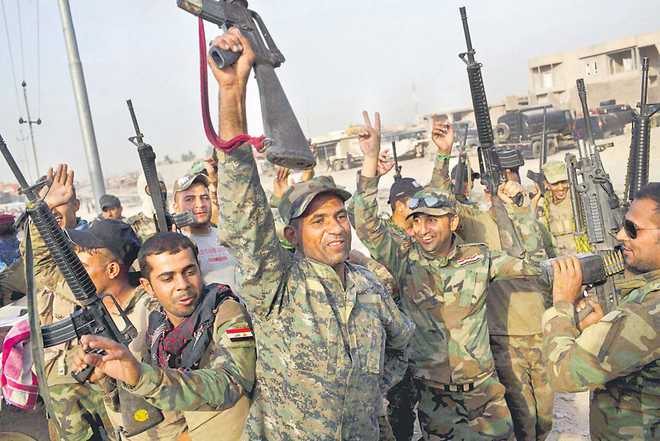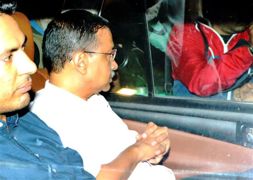
Retaking Mosul: Soldiers of the Iraqi army raise their weapons in celebration on the outskirts of Qayyarah, Iraq, on October 19, 2016. A senior Iraqi general called on Iraqis fighting for the Islamic State group in Mosul to surrender as the operation to retake the militant-held city entered the third day. AP/PTI
Lt Gen Syed Ata Hasnain (retd)
WITH ISIS (Daesh) under increasing pressure in Northern Iraq, it's future in West Asia may well be decided by the battle for Mosul which began on October 17. Western electronic media is beaming live pictures of the hostilities which have not yet begun in earnest. However, it will be a long-drawn and tragically a very bloody affair. How are battles for major cities fought in modern times and what major issues will decide the outcome of this battle? Before delving into any detail it may be remembered that Daesh is not down and out yet. It has the resources, the will and the capacity to fight; especially since it's so-called Amir, Abu Bakr Al Baghdadi is known to be in Mosul.
Mosul is the second-largest city of Iraq, with a population which was earlier 2.5-million strong. Currently, approximately a little more than one million people reside there after Daesh defeated the Iraqi army in 2014. The presence of civilian population of this magnitude creates more problems for the attacker who has to restrict the use of firepower and tip toe around the populated zones, if the morals of warfare are implicitly followed. The defender, on the other hand, has the option of using the population as a human shield to prevent unrestricted movement of the offensive force. This isn’t conventional warfare so rules are grudgingly followed as is evident with the kind of destruction witnessed in Fallujah a few months ago.
Cities usually have suburbs and even further away from the city centre are small rural clusters. These are used by the defender to prevent the offensive elements from closing with the city. Open stretches are mined with both anti-personnel and anti-tank mines and covered by missiles or anti-tank rockets to prevent tanks and infantry combat vehicles opening routes for the infantry. Once these peripheral zones are breached at the cost of heavy casualties, the defender will fall back on improvised explosive devices (IED) to cause more attrition as the battle moves into the city. The presence of population prevents the freedom of use of air power due to the high risk of collateral damage. In the case of the war in Syria and Iraq, estimates of civilian casualties from air strikes against cities have been extremely high. Entire stretches of Aleppo have been reduced to rubble and humanitarian considerations have not been in focus. To what extent the US air force will follow humanitarian norms in Mosul cannot yet be assessed. The battle for the core of the city will be equally bloody contingent upon the will of the defender, the resources available and, most importantly, the effectiveness or otherwise of the isolation and investment of the city. It is at that stage that the civilian population suffers the most. In Fallujah, one avenue of escape was kept open for the civilians to flee. Many Daesh fighters may attempt to exploit this opening too. What are isolation and investment? Before commencing the attack on a city, it is important for the attacker to cut off avenues of reinforcement or escape. The resultant isolation in the case of Mosul will ensure that Daesh fighters from elsewhere do not get in. Once the city is being reduced, there is no escape for Daesh to live and fight another day. The isolation involves placing tanks and ICVs centred on infantry deployments which are occupied astride the roads and tracks which act as avenues. Since Daesh would have deployed in the rural clusters around Mosul to deny close reconnaissance and a foothold into the city it is important for the Iraqi army to push back a major part of these elements to afford launch pads, footholds and other multiple options for the direction of commencement of the main attack against the city. The intent is to keep Daesh guessing and address the crust of the defences to punch holes through which the attacking troops will be funnelled.
The use of artillery to reduce the buildings from where resistance will be intense will be restricted but again contingent upon the discretion of the attacker. Once the penetrations have been effected, it becomes a slogging match. A city like Mosul is not closely packed with buildings. There are sufficient open spaces where helicopters can hover or land disgorging Special Forces who would target some specific objectives like command centres and communication facilities. The chief weapons of the infantry of the Iraqi army should be the rocket launcher to punch holes and destroy pill boxes; the sniper; and the flame thrower. The term Iraqi army, is being generically used here to signify the attacking force. It is however well-known that the offensive against Mosul has three or even four elements. First, is the Iraqi army, largely Shia but with many Sunnis too. Second is the Kurdish Peshmerga of Masoud Barzani from the north. Third are the US Special Forces and air force. The Shia militias are an important element, although there are reports that they may not participate unless things go wrong for the Iraqi army. The latest entrant is Erdogan's Turkish army which is attempting to secure a role for itself in both Syria and northern Iraq to prevent undue influence and political significance to the Kurdish elements involved in the fight. The US has made it clear that the presences of any foreign armed elements require approval of the government at Baghdad and such approval has yet to be given. The planning, command and control and application of a force of such disparate groups with their diverse interests and operational methods will be a big challenge. The possibility of some elements of Iran also being directly involved cannot be ruled out.
Russia is unlikely to be directly involved but it has promised full support to the Peshmerga in terms of arms and equipment supplies. Russia has also provided helicopters and artillery equipment to Iraq with the intent of ensuring that it retains influence in a fight which will be dictated by US advisers and planners. The bewildering issue currently is the emerging relationship between Turkey and Russia which is apparently taking a positive turn. How the Russian support to the Kurds of any hue and nationality will be taken by the Turkish leadership is unclear at present. The factor which should be uppermost in all minds is the effect that the operations and the intensity of Daesh resistance will have on the civil population. The displacement of the large population is not something the United Nations Office for the Coordination of Humanitarian Affairs (UNOCHA) is fully prepared for, financially or from infrastructure point of view. For a change in Iraq the human angle is being looked upon with great concern but clearly resources do not match requirement. The challenge is greatly multiplied by Daesh's propensity to remain unpredictable and resort to unethical practices such as a potential mass use of chemical weapons known to be in its possession. Finally, does the timing indicate any considerations other than military and strategic. With the US presidential election in another two weeks, could this have waited? That's the question no one will answer for now.
The writer, a former GoC of the Srinagar-based 15 Corps, is now a Fellow with the Delhi Policy Group.



























